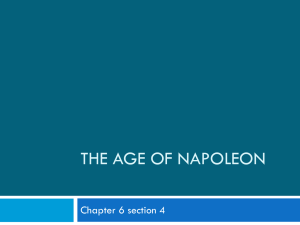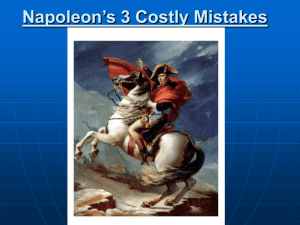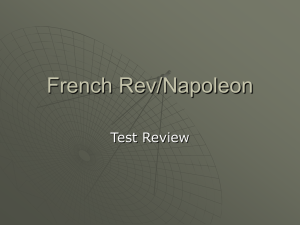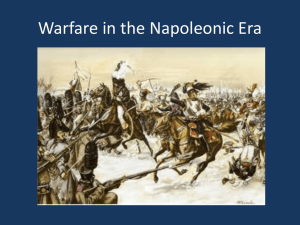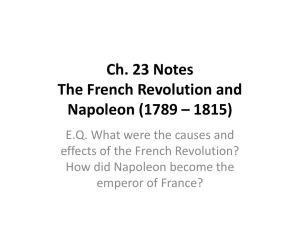Napoleon: Hero or Tyrant?
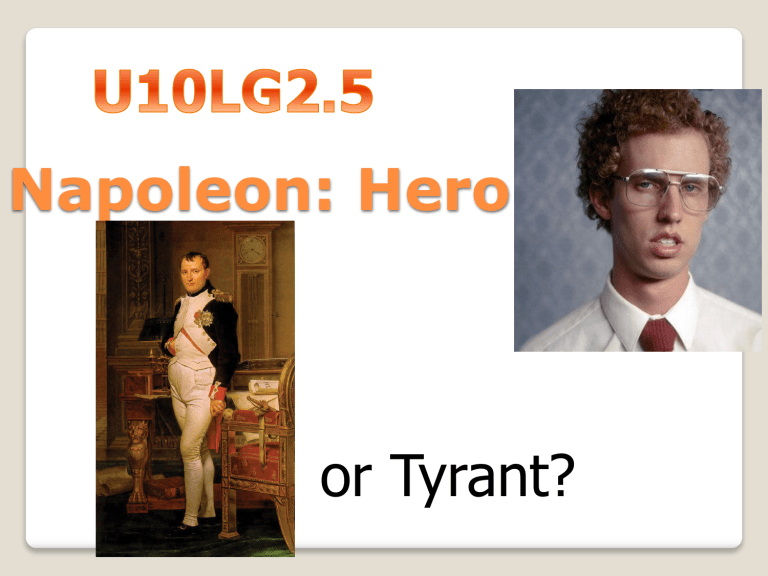
Napoleon: Hero?
or Tyrant?
Napoleon Bonaparte (1769-1821) came from a family of lower nobility but was sympathetic to the ideals of the French Revolution.
E. Napp
Napoleon’s Rise to Power
Napoleon Bonaparte ambitiously rose from army captain to ruler of France by taking advantage of the turmoil of the French
Revolution.
Opportunities for Glory
• Napoleon, brilliant military leader
•
•
•
•
In charge of French interior at 26
Invaded Italy and Egypt
Defeat by Admiral Horatio Nelson kept from newspapers
Became national hero
Napoleon Seizes Power
•
•
Directory weak and ineffective
Fear of royalists and of European opposition
November 1799 coup d’état •
•
•
France to be led by Consulate
Napoleon voted first consul, in effect a dictator for life
Napoleon promised order and stability, pledging to uphold key reforms. The
Emperor Napoleon
Napoleon crowns himself
◦ Submitted a plebiscite (VOTE) before voters
◦ Emperor Napoleon I
Desire for empire
◦ Wanted to rule Europe
◦ Napoleon sold Louisiana Territory and turned his focus to Europe
Image is Everything
Napoleon’s Policies
Napoleon made some basic revolutionary ideas part of the French government.
•
•
•
Napoleonic Code or Civil
Code developed
Preserved revolution ideas of equality for all but at the cost of freedom
•
Economic Reforms
Established the
Bank of France to regulate economy
Positions in the government and military based on merit, not birth
• More efficient tax-collection system
Napoleon & the Church
First made Peace with Catholic Church
Catholicism was made the religion of
France,
In return, the Pope would not ask for a return of the property sized in the
Revolution
Everyone Wins
•
•
•
Napoleonic Wars
Napoleon quickly defeated Russia,
Germany, Sweden, & Prussia
Controlled almost all of Europe and put Family members in positions of
Power
Great Britain had a dominant navy allowed it to be a thorn in Napoleon’s side
Napoleon’s ambition united Europe against him.
In 1812, Napoleon invaded Russia with an army of half a million men.
The Russians burned their own crops and buildings as they retreated, depriving the invaders of food and shelter.
E. Napp
By the time Napoleon reached Moscow, he found the city in ruins, set on fire by the Russians.
E. Napp
In bitter winter weather, Napoleon’s army retreated. Less than one in ten men survived the homeward march.
E. Napp
End of Napoleon
Spread of Nationalism: idea of a central identity
Invasion of Russia a disaster and left France weak and venerable
Final defeat by Duke of
Wellington at Waterloo



